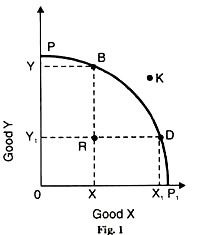In this article we will discuss about Scarcity and Choice as Economic Problems. After reading this article you will learn about: 1. The Problem of Scarcity 2. The Problem of Choice.
The Problem of Scarcity:
We live in a world of scarcity. People want and need variety of goods and services. This applies equally to the poor and the rich people. It implies that human wants are unlimited but the means to fulfil them are limited. At any one time, only a limited amount of goods and services can be produced. This is because the existing supplies of resources are extremely inadequate. These resources are land, labour, capital and entrepreneurship.
These factors of production or inputs are used in producing goods and services that are called economic goods which have a piece. These facts explain scarcity as the principal problem of every society and suggest the Law of Scarcity, The law states that human wants are virtually unlimited and the resources available to satisfy these wants are limited.
The Problem of Choice:
Since are live in a world of scarcity, a society can produce only a small portion of goods and services that its people want. Therefore, scarcity of resources gives rise to the fundamental economic problem of choice. As a society cannot produce enough goods and services to satisfy all the wants of its people, it has to make choices.
ADVERTISEMENTS:
A decision to produce one good requires a decision to produce less of some other good. So choice involves sacrifice. Thus every society is faced with the basic problem of deciding what it is willing to sacrifice to produce the goods it wants the most.
For instance, the more roads a country decided to construct the fever resources will there be for building schools. So the problem of choice arises when there are alternative ways of producing other goods. The sacrifice of the alternative (school buildings) in the production of a good (roads) is called the opportunity cost.
There are a number of problems that can arise from choices that are made by people, whether they are individuals, firms or government. Choices or alternatives (or opportunity cost) are illustrated in terms of a production possibility curve.
A production possibility curve shows all possible combinations of two goods that a society can produce within a specified time period whose resources are fully and efficiently employed.
ADVERTISEMENTS:
PP1 is the production possibility curve in Fig. 1 which shows the problem of choice between two goods X and Y in a country. Good X is measured on the horizontal axis and Good Y on the vertical axis. PP cue shows all combinations of X and Y good that can be produced by the country with all its resources fully and efficiently employed.
If the country chooses to produces more of X good, it would have to sacrifice the production of some quantity of Y good. The sacrifice of some quantity of Y good is the opportunity cost of producing some extra quantity of good X.
The PP1 curve is downward sloping because to produce more of good X involves producing less of Y good in a fully employed economy. Moving from point В to D on the PP{ curve means that for producing XX, more quantity of good X, YY quantity of good Y has to be sacrificed.
ADVERTISEMENTS:
Both point’s В and D represent efficient use of country’s resources. Point R which is inside the bounder of PP curve implies inefficient use of resources. Point К which is outside the boundary of PPX curve is an unattainable combination because the country does not possess sufficient resources to produce two combination of X and Y goods.
Central Problems of an Economy:
The resources are scarce; the society has to make a number of choices.
There are fee main categories of choices that a society must make:
1. What to goods and services produce and in what quantities?
2. How to produce these goods and services?
3. For whom to product them?
4. How efficiently are the resources being utilized?
5. Is the economy growing?
